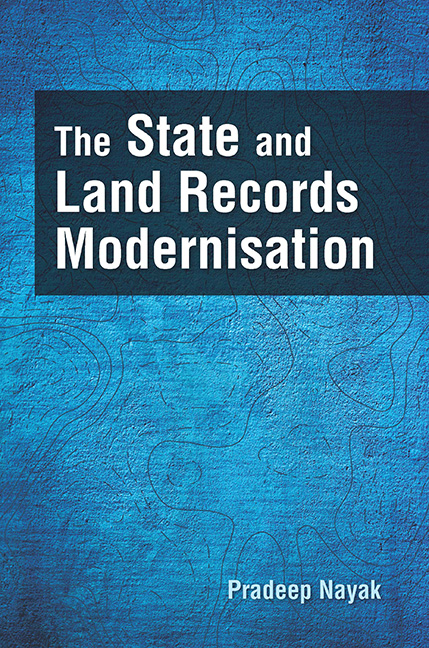Book contents
- Frontmatter
- Dedication
- Contents
- List of Figures and Tables
- Foreword
- Preface
- List of Abbreviations
- 1 The State, ICTs and Governance: A Theoretical Exploration
- 2 E-Governance in Public Policy Discourse in India
- 3 The State and the Policy of Land Records Management
- 4 The Computerisation of Land Records Programme in Odisha
- 5 The Computerisation of Land Records Programme in Karnataka
- 6 The Computerisation of Land Records Programmes in Karnataka and Odisha: A Comparative Study
- Conclusion: Beyond Techno-Managerial Governance
- Select Bibliography
- Index
2 - E-Governance in Public Policy Discourse in India
Published online by Cambridge University Press: 02 December 2022
- Frontmatter
- Dedication
- Contents
- List of Figures and Tables
- Foreword
- Preface
- List of Abbreviations
- 1 The State, ICTs and Governance: A Theoretical Exploration
- 2 E-Governance in Public Policy Discourse in India
- 3 The State and the Policy of Land Records Management
- 4 The Computerisation of Land Records Programme in Odisha
- 5 The Computerisation of Land Records Programme in Karnataka
- 6 The Computerisation of Land Records Programmes in Karnataka and Odisha: A Comparative Study
- Conclusion: Beyond Techno-Managerial Governance
- Select Bibliography
- Index
Summary
The discourse of e-governance has struck its root in India as a consequence of her achievement in IT sector and the English educated middle class population. Thanks to the liberal economic reforms, the rise of IT professionals and software export earnings has led some observers to propose that ICTs will enable India to leapfrog industrial age economies to information age. Undoubtedly, such developments have also strong significance for governance reforms and citizenship. There is growing influence of the IT entrepreneurs and NGOs who advocate the adoption of IT corporate governance model to the public bureaucracy. Ideologically, e-governance discourse in India promises to bring political transparency and techno-managerial notion of governance. In India, the whole discourse of e-governance is anchored on using ICTs to prevent corruption. Mazzarella observes:
The Indian incorporation of the information society did not just invoke both a new commodity fetish (sleek consumer computing) and a new human right (the right to information). Computers networked by means of the Internet…offer a new weapon against the most ingrained of official infirmities: corruption… the attraction was rooted in a naïve notion of the inherent incorruptibility of the digitised information, as opposed to the surreptitious modifications to which handwritten ledger entries were so manifestly subject.
In understanding the current e-governance discourse in India, it is necessary to understand the contemporary ideological trends and practices in public policy sphere. Govindan Parayil locates the euphoria of IT led development beliefs in the context of contemporary neoliberal developmental discourses advocated by donor agencies and many civil society organisations in the context of failure of the modernisation and dependency theories of development. India is not immune from such intellectual trends. ‘ICT fetishism and cyber libertarian development thinking has enveloped the discourse on information revolution and socio-economic development in the world.’
Scholars in India have been confronted with two types of issues with regard to neoliberal reform agenda in India viz., the kind of governance institutions or arrangements or specifically political institutions that are required by an economically liberalising, multireligious and multicultural society, and the capability of the neoliberal governance agenda to retain an emphasis on redistributive and welfare goals and address the rights, claims and demands for justice of disadvantaged groups.
- Type
- Chapter
- Information
- The State and Land Records Modernisation , pp. 36 - 74Publisher: Foundation BooksPrint publication year: 2015

